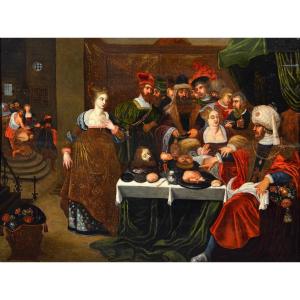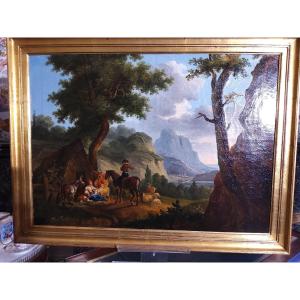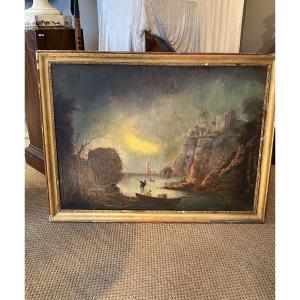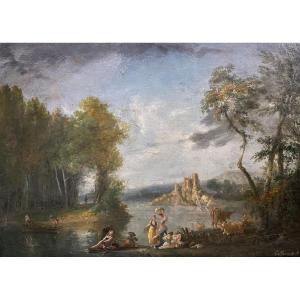Architectural Capriccio with ancient classical ruins
Oil on canvas
cm. 56 x 112
with frame cm. 77 x 130
Expertise of Prof. Emilio Negro (Bologna)
FULL DETAILS CLICK HERE
This well-preserved work, whose pendant is available (link), depicts a wide view with ruins of Roman antiquities assembled in such a way as to create an imaginative scenario, where there are more or less ruined buildings of various kinds such as arches and amphitheatres, colonnades, altars, statues, reliefs, and fragments of cornices.
The blue sky enlivened by clouds and the presence of foliage and plant elements well inserted among the archaeological remains add great charm to the views, illuminated by a golden light and enlivened by the presence of various picturesque characters arranged in small groups, which give rhythm to the composition by introducing a narrative element.
This is a highly collectible work, executed around the middle of the 18th century by the Venetian-born painter Jacopo Fabris (Venice, 1689 - Charlottenborg, 1761), reflecting both in terms of style and compositional choices his grandiose views of Rome, commissioned during his career by patrician nobles from the major European courts.
The attribution is confirmed by the technical characteristics, such as the luminous quality of the colour and the vibrant rendering of the human figures, elements that easily juxtapose this canvas with the series of Roman vedute happily grouped in the painter's catalogue.
Fabris' pictorial production is closely linked to his activity as a set designer and theatre painter, producing numerous perspective views mostly inspired by characteristic Roman or Venetian views, almost always complemented by fantastic inserts.
His views were collected by the European aristocracy during the ritual Grand Tour in Italy, appreciated and requested by wealthy foreign tourists who yearned to possess on their return home, in addition to the more canonical perspective views, this kind of fantasy architectural scenery as a luxurious souvenir.
Fabris specialised in painting architectural views first in his native Venice, which he left around 1720 to go to Rome, where he came into contact with Canaletto, who had also arrived in the papal city.
Much of his career, however, took place abroad: in Germany, as court painter in Karlsruhe (1719-21) in Hamburg (1724-8), and at the Berlin Opera in the service of Frederick II the Great, and then in Denmark, where he arrived in 1746 at the court of King Frederick IV.
Very active between Copenhagen and Charlottenborg, it is in this latter period that most of Jacopo Fabris' known perspective inventions are to be found, and it is precisely in this phase of his life that we can probably place the realisation of our canvas. It is easy to compare it with the decoration that the Venetian painted in 1750 in the old dining room overlooking the garden of Fredensborg Castle, consisting of ten large paintings and three smaller door panels, all depicting similar partially fantastic views with ruins and lively figures.
ADDITIONAL INFORMATION:
The painting is completed by an attractive gilded wooden frame and is sold with a certificate of authenticity and descriptive iconographic card.
We take care of and organise the transport of the purchased works, both for Italy and abroad, through professional and insured carriers.
Contact us for any information, we will be happy to answer you.
Follow us also on :
https://www.instagram.com/galleriacastelbarco/?hl=it
https://www.facebook.com/galleriacastelbarco/


















































 Le Magazine de PROANTIC
Le Magazine de PROANTIC TRÉSORS Magazine
TRÉSORS Magazine Rivista Artiquariato
Rivista Artiquariato